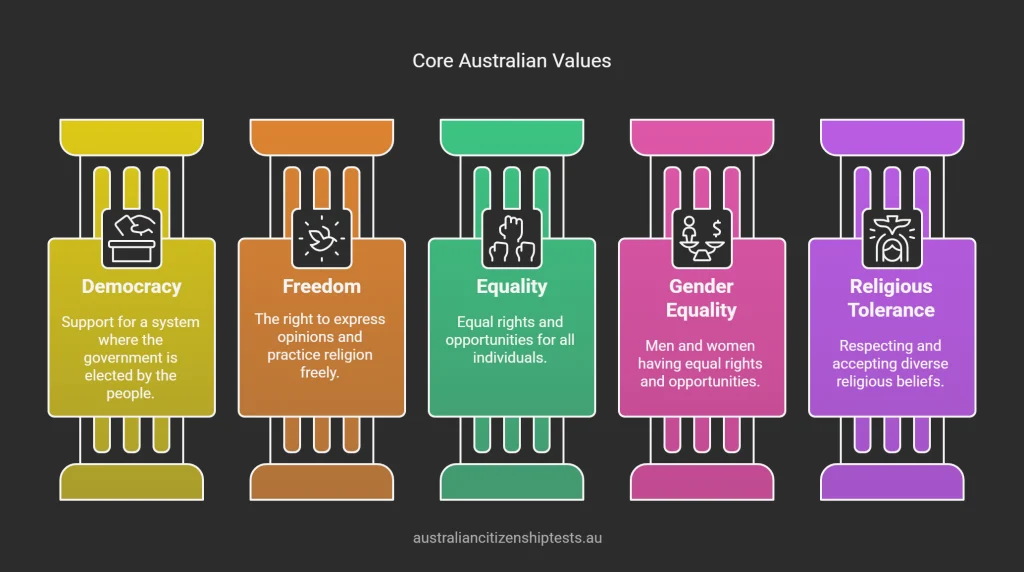
If you’re a non-citizen planning to live in Australia permanently, taking the Australian citizenship test is a required step. This test is part of the Citizenship Act 2007 and applies to most visa holders who are moving to permanent residency (PR) or applying for full citizenship. Whether you’re on the PR pathway or completing your immigration process, understanding citizenship eligibility is essential. Common questions like “Who needs to take the Australian citizenship test?” or “What are the requirements?“ have a simple answer: if you’re aiming to become an Australian citizen, this test is for you.
The Test Is Legally Required for Citizenship
- Mandatory Requirement: You must pass the Australian Citizenship Test to apply for citizenship, even if you already have permanent residency.
- Purpose: The test helps ensure you understand your rights and duties as an Australian citizen.
- No Test, No Citizenship: If you don’t pass the test, you can’t apply for citizenship, even with permanent residency.
- Application Form: The Citizenship Application Form 1300t explains all the steps, including the test.
Meeting these requirements is essential for becoming an Australian citizen.
Proving You Understand Australian Values
The Australian Citizenship Test ensures that applicants understand and align with Australia’s core principles, including:
- Democracy: Support for a system where the government is elected by the people.
- Freedom: The right to express opinions and practice religion freely.
- Equality: Equal rights and opportunities for all individuals.
- Gender Equality: Men and women having equal rights and opportunities.
- Religious Tolerance: Respecting and accepting diverse religious beliefs.

The test includes questions on these values to confirm your understanding and commitment to them. This assessment is part of the citizenship application process, as outlined in the Australian Citizenship Act 2007.
PR vs Citizenship
Citizenship offers rights that permanent residency (PR) does not. For example, only Australian citizens can vote in elections, run for public office, or hold an Australian passport. While PR allows you to stay in Australia long-term, it has limitations. PR visas can expire if you spend too much time outside the country, but citizenship lasts for life, no matter where you travel.
Another important difference is in the rules around dual citizenship. Australia allows its citizens to hold multiple nationalities, but PR status can sometimes create issues with other countries’ residency rules. From my experience working with immigrants, many choose citizenship because it offers permanent status and benefits like the right to re-enter Australia freely and eligibility for government jobs.
Avoiding Delays in Your Citizenship Application
Failing the Australian citizenship test means you’ll have to wait at least six months to retake it, causing delays in your application. This also delays your access to important rights like voting, getting an Australian passport, or receiving government benefits. The Department of Home Affairs enforces these waiting periods strictly, and reapplying can take even longer.
If you disagree with your test result, you can appeal to the Administrative Appeals Tribunal (AAT), but this process can add several months to your application timeline. Based on my experience helping applicants, thorough preparation—such as studying Australia’s values, history, and democratic principles—greatly reduces the chances of delays.
Understanding the test format and practicing with sample questions can also help you avoid retakes. Delays aren’t just a paperwork issue; they affect your ability to fully participate in Australian society.
Exemptions: When You Don’t Need the Test
Some applicants are exempt from the Australian Citizenship Test due to age, disability, or special circumstances:
Age-Based Exemptions:
- Applicants under 18 are automatically exempt.
- Applicants 60 and older are also automatically exempt.
Disability Exemptions:
- Applicants with a permanent or lasting physical or mental disability that prevents them from understanding the application or showing basic English knowledge may qualify for an exemption.
Special Circumstances:
- Applicants with significant hearing, speech, or sight impairments may be exempt.
To apply for an exemption, you must provide medical evidence from a qualified professional. This evidence should explain how your condition affects your ability to meet the test requirements.
FAQs
Who needs to take the Australian Citizenship Test?
Applicants aged 18–59 applying for Australian citizenship by conferral must take the test. Most permanent residents (PR) applying for citizenship also need to take the test.
Can I skip the test if I’m over 60 or have a disability?
Yes! If you are 60 or older, or have a permanent disability (e.g., hearing loss or dementia), you do not need to take the test. You’ll need to provide a medical certificate or other supporting documents to qualify for an exemption.
Can I apply for citizenship without taking the test?
You can only apply without taking the test if you qualify for an exemption (e.g., due to age or disability). All other applicants must pass the citizenship test before applying for citizenship.
Conclusion
The Australian Citizenship Test is a required step for most people applying to become citizens. To get rights like voting, holding an Australian passport, or lifelong benefits (which permanent residency doesn’t offer), you must pass this test. It shows you understand and support Australia’s values—like democratic freedom, gender equality, and religious tolerance—and helps you fit into Australian society.
Some people don’t have to take the test, like those under 18, over 60, or with certain disabilities. For everyone else, passing it is mandatory. If you fail, you might face delays, like retaking the test or appealing through the AAT (Administrative Appeals Tribunal). But it’s worth it! When you pass, you’ll get your Citizenship certificate and can proudly sing the Australian national anthem with others. This isn’t just paperwork—it’s your chance to fully belong in Australia and enjoy opportunities for life.
